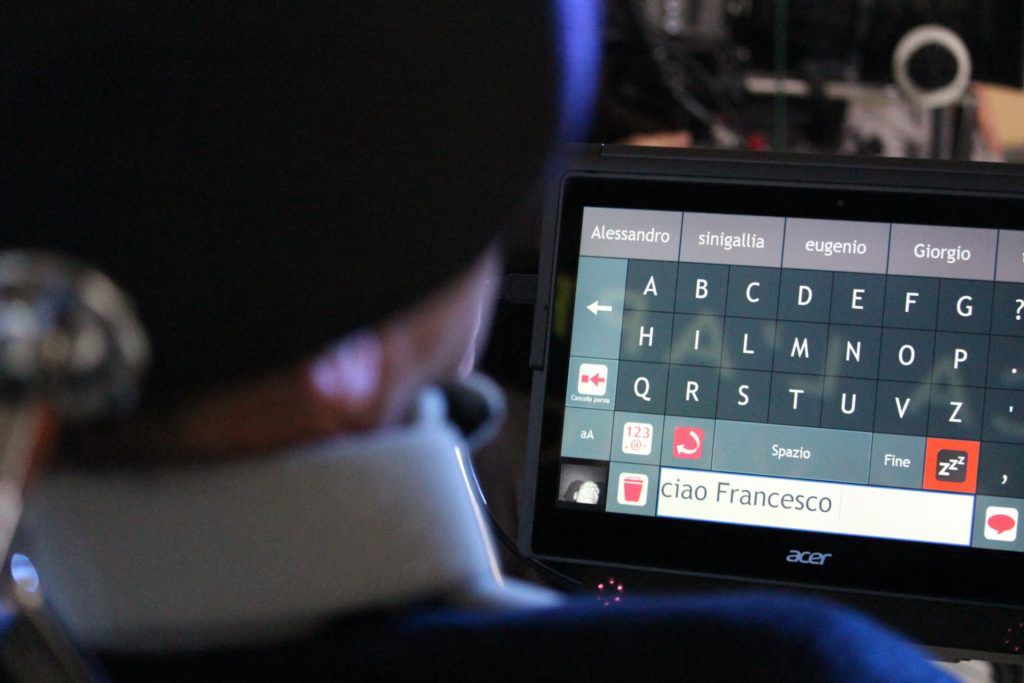Aisla welcomes the new implementing decrees of the Disability Law [L. 227/2021] which introduce new definitions and rules to protect people with disabilities and guarantee their right to adequate assistance and the prevention of any form of discrimination. However, it is clear that there is still much to be done to raise awareness in society on these issues. Among these, communication represents one of the most important challenges, as it is an inalienable right of everyone, regardless of health or abilities. Although the New York Convention on the Rights of Persons with Disabilities, ratified by Italy, emphasizes the importance of access to communication in order to ensure the autonomy and independence of disabled persons, the path to ensure Complete protection of this right is still a long way off.
Aisla’s long commitment to guaranteeing people with ALS the possibility of continuing to communicate, even when the disease prevents the use of the voice and does not give the possibility of writing, fits into this context. Today we witnessed the simulation of a public act through the eye pointer, but this journey together with the Notary began in November 2015 with the presentation of a first proposal in Milan, during the 50th National Notary Congress. The request arises from the sensitivity of the Milanese notary towards “non-verbal communication”, recognizing the impact of technology in the creation of a new reality. Even then, as today in Rome, a demonstration of the value and effectiveness of these tools was presented.
Communication, the right is there but in reality…
People with a disability, such as ALS, who do not have cognitive problems but have difficulties in traditional communication, have alternative systems at their disposal, such as “eye-pointing communicators”. These devices exploit controlled eye movement, thanks to technological advances in the medical field, and allow people to express themselves independently. The use of the eye pointer represents an important step forward in the right to communication and self-determination for all people who, due to illness, have lost the use of speech and the mobility of their body. This technology allows them to express their wishes independently and without the need for interpreters or mediators, thus guaranteeing everyone the right to continue to be the owner of their own “Life Project”, responsible for their own choices and advocate of objectives and expectations.
Fulvia Massimelli, national president of Aisla
However, although there have been several sentences that welcome the use of the aid, full implementation is still far away. It is important to remember the 2022 case, in which a Piedmontese minor was unable to renew his identity card due to the inability of his mother with ALS to physically go to the Municipality to sign the documents. This case highlights the challenge and importance of stronger action. Fortunately, the response of the Turin judges was quick, but only partially resolved the issue: the woman’s support administrator husband was appointed.
This experience is just one example of the many requests for help that our National ALS Listening Center receives. The right to communication and self-determination, with its many facets, is therefore a topic on which not only greater sensitivity is needed, but above all greater awareness. We must continue to work to protect the subjective right of people with severe neurological disabilities, such as ALS, to actively participate in social, political, economic and legal life and to fully enjoy their fundamental rights.
The role of the Notary
As highlighted by the Notary Council of Milan in 2015, signing represents an inalienable right for everyone, even for those who have physical limitations but maintain full cognitive capacity. Therefore, preventing a person with ALS from participating in negotiating acts would be unacceptable discrimination. This attitude not only goes against international law, but does not recognize articles 2 and 3 of the Italian Constitution, which do not provide for distinctions in access to constitutional rights and establish the institutional commitment to the need to remove the obstacles that effectively limit the full fulfillment of the person.
The role of the National Council of Notaries, then, is extremely important because it guarantees equal rights to people affected by illnesses or physical disabilities, allowing them to communicate easily with the correct aids and in compliance with the law. This not only protects people’s independence and dignity but also allows them to freely express their wishes in official acts, thanks to the opportunities offered by modern technology. In this way, people with ALS and other serious disabilities can overcome the barriers imposed by the disease while continuing to be active citizens.
Aisla, the association representing people with ALS, is committed to defending the right to communication for everyone, regardless of disability. The alliance with the institutions must create the conditions to continue to pay ever more attention to this issue, with an active commitment to promoting accessibility to communication for all people, including those affected by ALS. Only through a collective effort and the practical application of existing rules will we be able to guarantee full respect for the dignity and self-determination of people with disabilities.
Fulvia Massimelli is national president of the Italian Amyotrophic Lateral Sclerosis Association-Aisla. The photos are from Aisla’s press office
